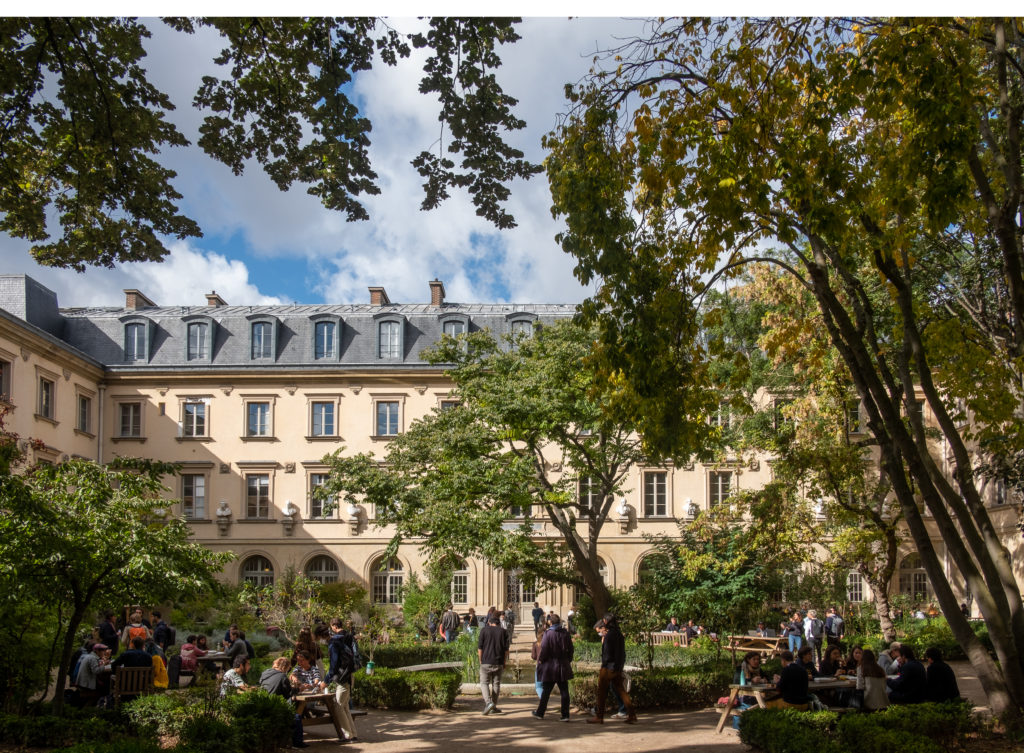GOALS
The ENS Diploma in Mathematics, provides an original training of excellence for pure and applied mathematicians, having acquired solid knowledge in other disciplines (computer science, physics, biology,…). It is a three-year training program in and through research. Its major advantage is a faster pace made possible by reinforced supervision, particularly through individual tutoring. Several courses are available, including multidisciplinary courses.
JOB OPPORTUNITIES
Upon graduation, the student can continue his or her studies in mathematics by preparing a doctorate. He or she can also immediately take a professional job. In the medium term, after the thesis, possible openings include:
- researcher in pure or applied mathematics in a public research organization (CNRS, CEA, INRIA, ONERA, CNES…) or private (research and development in the banking sector, transport, …);
- academic position at the univeristy;
- mathematical engineer in the industry;
- teaching in preparatory classes and more generally in post-baccalaureate education (engineering schools, specialized training…).
Bridges are possible during the course of studies to courses offered by other departments of the ENS, including computer science, physics, economics, and biology. Possibilities of leaving during the course of training for university courses can be arranged in agreement with the partner universities.
THE ENS DIPLOMA IN MATHEMATICS
Students from ENS receive the Diplôme de l’ENS mention mathématiques at the end of their studies, provided that they have satisfied the following conditions:
- registration for the ENS diploma, mandatory each year,
- obtaining a research master in mathematics,
- Validation of each of the three years of the Department of Mathematics and Applications according to the rules outlined on the pages dedicated to each year,
- the validation of 72 ECTS in addition to the national Bachelor and Master degrees, including:
- 24 ECTS of mathematic courses
- 18 ECTS de non-mathematic scientific courses, to be chosen from the list of non-mathematical courses offered by the Department of Mathematics and Applications or from the model of another scientific department (physics, computer science, biology, chemistry, geosciences, cognitive studies) in acc ord with the tutor.
UNIVERSITY REGISTRATION
After their admission, students of the ENS register with the partner universities via the teaching secretariat of the ENS mathematics department. During the course of their studies, they must obtain the national bachelor’s and master’s degrees issued on the basis of the results obtained in the various teaching modules according to the following procedures:
- For the third year of the bachelor’s degree (L3) and the first year of the master’s degree (M1), courses and exams take place in the mathematics department of the École Normale Supérieure and the results are sent to the partner universities;
- For the second year of the Master’s program (M2), students enroll directly in the partner universities that award the degrees;
- at the end of the last year of the program, having completed the master’s degree, students who wish to do so can prepare a doctoral dissertation, subject to the agreement of a research director as well as the various supervisors at the university where they are enrolled (thesis delegate, director of the doctoral school to which they are attached, director of their host laboratory).
MENTORING
The supervision of mathematics students is ensured by a system of individualized tutoring, and supervised by the Director of Studies. Each year, a tutor, member of the Department of Mathematics and Applications of the ENS, is assigned to each student. The tutor is chosen randomly in the first year, and for the other years, according to the themes of preference indicated during the end-of-year interview. The role of the tutor is to help the student organize his or her studies, to advise him or her on his or her choice of work and reading topics, and to provide crucial support for his or her orientation. At the beginning of each year, a program of study is developed by the student, his/her tutor and the Director of Studies, and signed by these parties. It is strongly recommended that you visit your tutor regularly.
INTERNSHIP
The mathematics curriculum includes an internship of at least 4 months, preferably abroad. The purpose of this internship is to familiarize the student with a different environment. Students are given the greatest possible flexibility for this internship and a certain amount of initiative is required in return. The positioning of this internship in the three years of teaching or research, the scientific theme, the linguistic aspect are all parameters to be taken into account and this requires thinking about it well in advance, talking about it with one’s tutor and the DMA supervisors.
To help set up this internship, the members of the mathematics department propose host universities and potential supervisors for stays abroad, in various fields, at the M2 level or higher. A partial list is available on the ENS mathematics department’s teaching website. Students are expected to contact the proposed foreign supervisors not directly, but through the members of the mathematics department.
ORGANIZATION OF TRAINING
The curricula are individual and developed at the beginning of each year with the tutor, the director of studies or teaching and the supervisors of the mathematics department. Numerous curricular variations are possible:
– mathematics
– mathematics/computer science
– mathematics/physics
– mathematics/biology.
The multidisciplinary courses allow, subject to confirmation by the competent jury, the validation of a second speciality for the ENS diploma. The supervisory team may examine any coherent individual proposal for a course of study presented by the students and in keeping with the spirit of the program. In general, students must obtain the approval of their tutor and the director of studies or teaching for all choices concerning their program of study.



